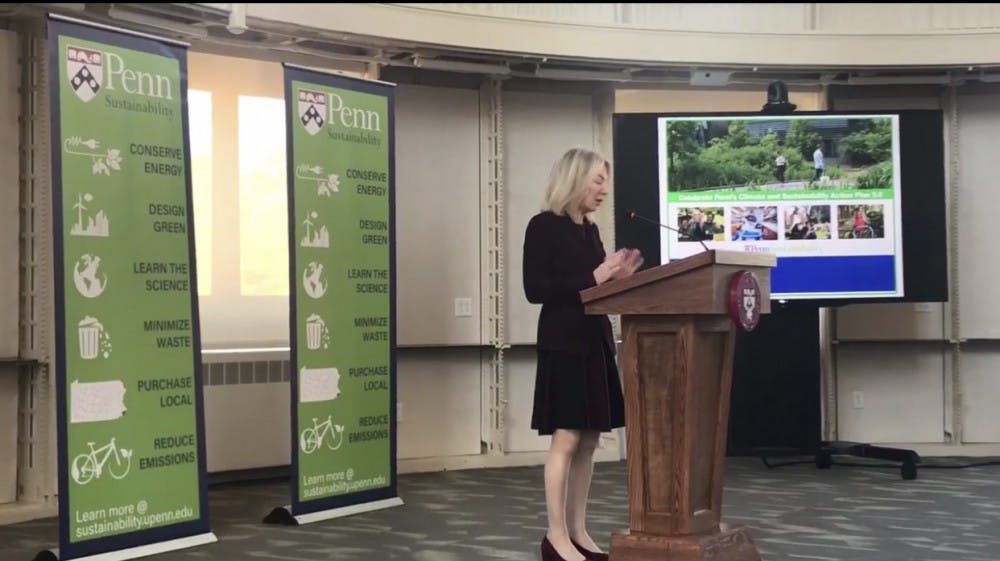
Penn released its latest Climate and Sustainability Action Plan 3.0 on Tuesday, highlighting its five-year goals to promote sustainability on campus.
This is Penn's third Climate Action Plan, following an initial five-year plan in 2009 and 2014's Climate Action Plan 2.0. The new plan, which sets goals from 2019 to 2024, addresses issues such as increasing academic study of environmental issues, reducing carbon emissions and waste, and promoting sustainable behaviors among members of the Penn community.
Upon release, the Climate Action Plan 3.0 received considerable backlash from Fossil Free Penn, which argued the plan does not go far enough.
College senior Jacob Hershman, actions coordinator for Fossil Free Penn, said 15 members stood outside the plan's unveiling with signs saying “Not Enough” and “Stop Funding Climate Change." When members of Fossil Free Penn approached Penn President Amy Gutmann to inquire about her investment in fossil fuels, Hershman said they were ignored.
The plan is organized around seven goals developed by Penn's Environmental Sustainability Advisory Committee, which is made up of faculty, students, and staff who advise the president on sustainability issues.
University Architect Mark Kocent said one major change from previous versions of the plan is that "sustainability" was added to the title, moving away from an exclusive focus on climate change.
“The previous versions were just called the 'Climate Action Plan,'" Kocent said. "This one intentionally was called the 'Climate and Sustainability Action Plan.' Many of the things it encompasses are really focused on trying to encourage sustainable behaviors from the campus population as well as outreach in the academic component.”
In terms of "Utility and Operations," Penn Sustainability aims to reduce carbon emissions from buildings by 40% by 2024 and ultimately become carbon neutral by 2042. The "Outreach and Engagement" goal plans to create programs that get Penn students and leadership more involved in sustainability.
On "Academics," the plan calls for increasing cross-disciplinary environmental research, creating a "campus-as-lab" program for applied sustainability learning, improving opportunities for sustainability education at Penn, and developing a Civic Sustainability Fellowship program to give Penn students internships with local environmental agencies.

The "Physical Environment" goal calls for using sustainable practices in campus design and water management. This ties into "Waste Minimization and Recycling," which involves tracking waste and evaluating infrastructure to decrease the amount of garbage Penn sends to landfills.
For the "Purchasing" goal, Penn Sustainability plans to shift to buying sustainable food products and office equipment, as well as encouraging purchase of low-emission vehicles. The plan also includes a specific goal for "Transportation," which involves adding four new electric charging stations and making campus more accessible for bicyclists and pedestrians.
The seven broad goals of this year's plan match those of the 2014 Climate Action Plan 2.0, which have seen steady progress, according to a Penn Sustainability report. While Penn offered 170 courses related to sustainability in 2014, today there are more than 400 sustainability-related courses. Between 2014 and 2019, Penn has also reduced building-related carbon emissions by 14.8% and increased waste diversion to 28%. As of 2019, 48% of staff now commute sustainably through carpooling, biking, or public transit.
Hershman said the new plan is “cursory," “vague," and “doesn’t improve upon anything set out in 2014." He said many of Penn's 400 sustainability courses are not really related to sustainability and criticized the University for sending waste to incinerators in disadvantaged communities.
“The basis of our campaigns has always been Penn is not doing enough, and thus requires a group like Fossil Free Penn to keep pushing for higher standards," Hershman said. "An institution like Penn that has an endowment of $14.7 billion not only has a symbolic and moral responsibility to make these changes, it also has the financial capital to do so and it’s not doing it.”
The Daily Pennsylvanian is an independent, student-run newspaper. Please consider making a donation to support the coverage that shapes the University. Your generosity ensures a future of strong journalism at Penn.
Donate







